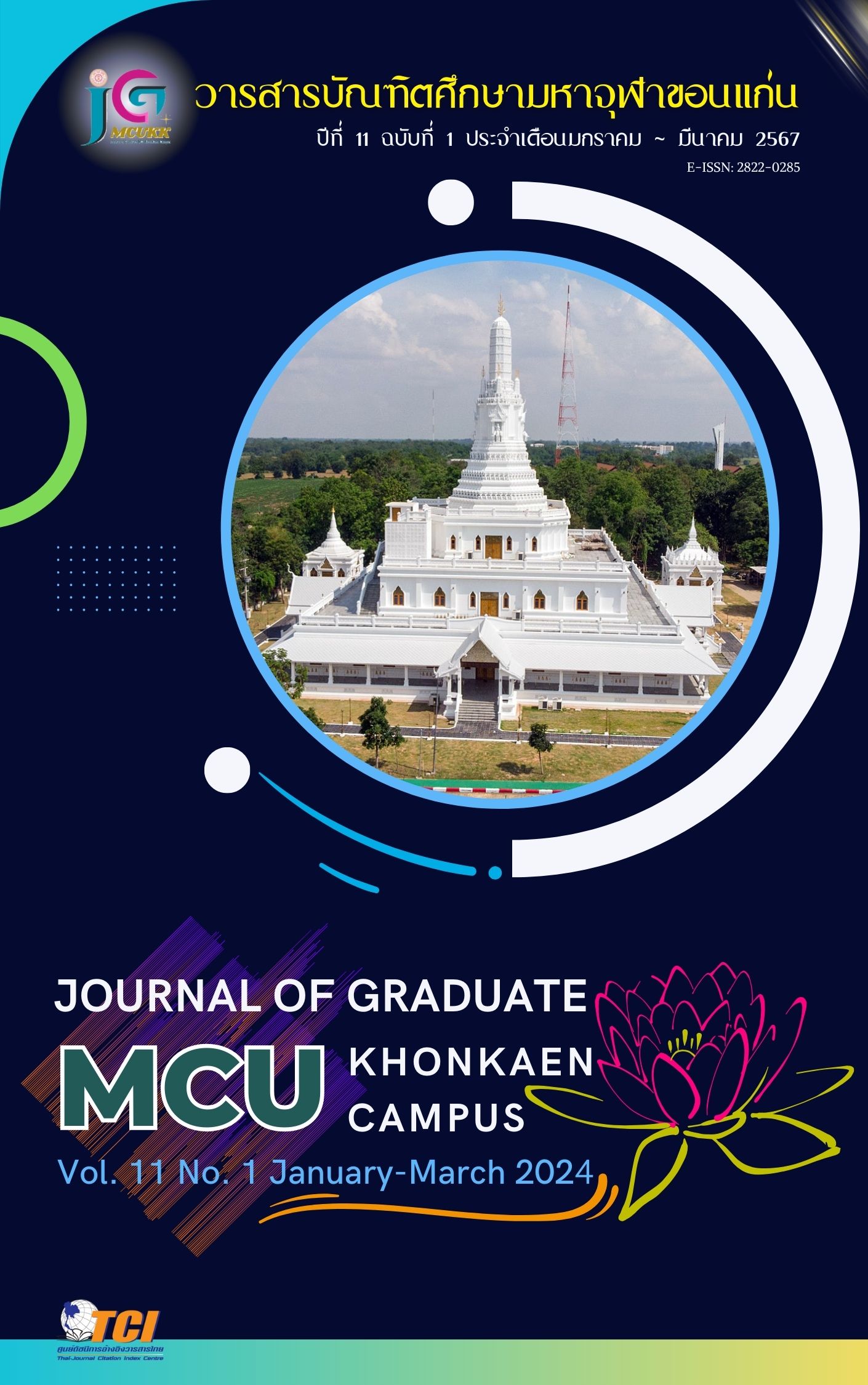Promoting Well-Being and Caring for the Elderly in the Family According to Buddhist Principles
Main Article Content
Abstract
The purpose of this academic article is to study the promotion of well-being and care for the elderly in the family according to Buddhist principles. Mental well-being is important to the quality of life of the elderly. Supporting the rights and benefits of the elderly is effective and in accordance with the provisions of the Constitution of the Kingdom of Thailand. and social relations in living according to the principles of Buddhism. The 4 principles of meditation include body meditation, physical development, spiritual meditation, behavioral development, mental meditation, mental development, wisdom meditation, intellectual development. It is a tool for improving the health of the elderly so that they can live effectively in society and to carry out operations related to protection and care Promoting and supporting the rights and benefits of the elderly is effective and consistent with the provisions of the Constitution of the Kingdom of Thailand. Apply the principles of Buddhism as a guideline for developing, promoting well-being and caring for the elderly in the family.
Article Details

This work is licensed under a Creative Commons Attribution-NonCommercial-NoDerivatives 4.0 International License.
References
กระทรวงการพัฒนาสังคมและความมั่นคงมนุษย์. (2561). ยุทธศาสตร์กรมกิจการผู้สูงอายุ 20 ปี พ.ศ. 2561-2580. กรุงเทพฯ: สามลดา.
กรุงเทพธุรกิจ. (2567). วิกฤตเด็กเกิดน้อยสูงวัยพุ่งส่งผลกระทบประเทศ. สืบค้นเมื่อ 14 มีนาคม 2567, จาก https://www.bangkokbiznews.com/health/well-being/1115919.
ปัทมา ยมศิริ และคณะ. (2563). การบูรณาการพัฒนาคุณภาพชีวิตผู้สูงอายุตามแผนพัฒนาเศรษฐกิจและ สังคมแห่งชาติ ฉบับที่ 12 (พ.ศ. 2560 - 2564). วารสารสังคมศาสตร์และมานุษยวิทยาเชิงพุทธ, 5(9), 216-229.
พระพรหมคุณาภรณ์ (ป.อ.ปยุตฺโต). (2540). พุทธธรรมกับการพัฒนาชีวิต. กรุงเทพฯ: ธรรมสภา.
พระพรหมคุณาภรณ์ (ป.อ.ปยุตฺโต). (2551). พจนานุกรมพุทธศาสน์ ฉบับประมวลศัพท์. กรุงเทพฯ: เอส. อาร์. พริ้นติ้ง แมส โปรดักส์.
พระพรหมคุณาภรณ์ (ป.อ.ปยุตฺโต). (2557). สุขภาวะองค์รวมแนวพุทธ. (พิมพ์ครั้งที่ 33). กรุงเทพฯ: ผลิธัมม์.
พระพรหมคุณาภรณ์ (ป.อ.ปยุตฺโต). (2558). พจนานุกรมพุทธศาสตร์ ฉบับประมวลธรรม. (พิมพ์ครั้งที่ 31). กรุงเทพฯ: ผลิธัมม์.
พระมหาเชาวฤทธ ทรัพย์สวัสดิ์ นรินฺโท และคณะ. (2562). การศึกษาแนวทางการพัฒนาคุณภาพชีวิตผู้สูงอายุตามหลักภาวนา 4 กรณีศึกษา : ผู้สูงอายุบ้านห้วยหอย ตำบลธาตุทอง อำเภอภูเขียว จังหวัดชัยภูมิ. (รายงานการวิจัย). ขอนแก่น: มหาวิทยาลัยมหาจุฬาลงกรณราชวิทยาลัย วิทยาเขตขอนแก่น.
มหาวิทยาลัยมหาจุฬาลงกรณราชวิทยาลัย. (2539). พระไตรปิฎกภาษาไทย ฉบับมหาจุฬาลงกรณราชวิทยาลัย. กรุงเทพฯ: มหาจุฬาลงกรณ์ราชวิทยาลัย.
ราชบัณฑิตยสถาน. (2546). พจนานุกรม ฉบับราชบัณฑิตยสถาน พ.ศ.2542. กรุงเทพฯ: บริษัท นานมีบุคส์ พับลิเคชั่นส์ จำกัด.
สิริหทัย มูลวนิชย์. (2551). ปัจจัยที่เกี่ยวข้องกับความว้าเหว่ของผู้สูงอายุในชมรมวชิรพยาบาล. (วิทยานิพนธ์การศึกษามหาบัณฑิต). กรุงเทพฯ: บัณฑิตวิทยาลัยมหาวิทยาลัยศรีนครินทรวิโรฒ.
Campbell, A. (1976). Subjective measures of well-being. American Psychologist, 12,117-124.
Cobb, S. (1976). Social support as a moderator of life stress. Psychosomatic Medicine, 38(5), 300-314.
House, J. S. (1981). Work stress and social support. Reading, Mass: Addison-Wesley.
Schaefer, C., Coyne, J. C., & Lazarus, R. S. (1981). The health-related functions of social support. Journal of Behavioral Medicine, 4(4), 381-405.
Weiss, R. (1974). The provision of social relationship. In R. Zick (Ed.), Doing unto others (pp. 17-26). Englewood Cliffs, NJ: Prentice Hall.

